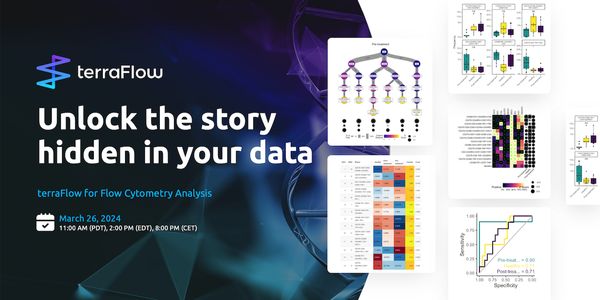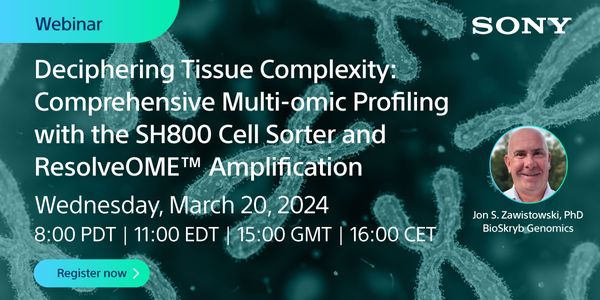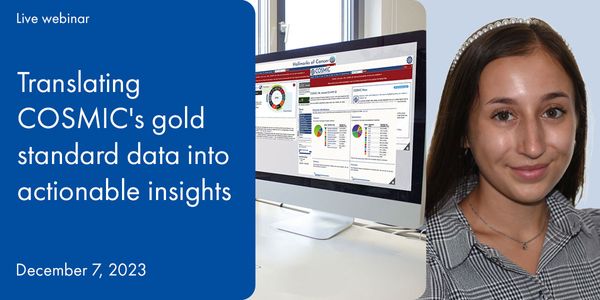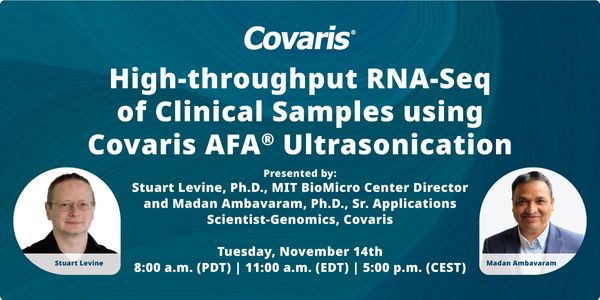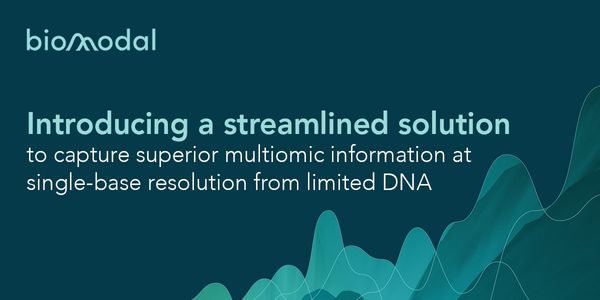Sequencing
Sequencing: is the process of determining the nucleic acid sequence - the order of nucleotides in DNA. It includes any method or technology that is used to determine the order of the four bases: adenine, guanine, cytosine, and thymine.
-
De novo gene synthesis and protein expression are established technologies that can give access to nearly any target DNA or protein sequence, allowing for engineering of biologics. In this p...Speaker: Claudia ChiocchiniPresented at: Cancer Research & Oncology Virtual Event Series 2024
Sponsored By: Thermo Fisher Scientific
MAR 28, 2024 | 8:00 AM
B cell responses within pancreatic ductal adenocarcinoma (PDAC) tumors are associated with improved patient outcomes, yet the specific triggering antigens remain largely unknown. In this web...
MAR 27, 2024 | 9:00 AM
Join Dr. Emily Hodges, assistant professor of biochemistry at Vanderbilt University, to learn more about how the Hodges Lab is utilizing the 6-base genome to investigate the dynamics of enha...
MAR 26, 2024 | 11:00 AM
Ever wonder what you’re missing in your data? The sheer complexity of today’s flow and mass cytometry datasets demands automated solutions. Machine learning plugins only provide...
MAR 26, 2024 | 8:00 AM
DNA fragmentation is a critical step in preparing DNA libraries for short read-based protocols. The two primary methods are mechanical shearing (using acoustic technology like Covaris) and e...
MAR 21, 2024 | 10:00 AM
Next-generation sequencing (NGS) based liquid biopsy is emerging as standard of care in oncology for comprehensive genomic profiling (CGP) of solid tumors. In this presentation we will showc...
MAR 20, 2024 | 8:00 AM
Deciphering somatic mosaicism in healthy tissues and clonal diversity in tumors necessitates single-cell analysis. High-quality genomic and transcriptomic data at the single-cell level depen...
FEB 28, 2024 | 10:00 AM
Mariana Kiehl (Sr. Applications Scientist at Roche Sequencing & Life Science) describes the KAPA Total Prep FFPE workflow, a novel single-tube method for combined sequencing of DNA and R...
DEC 14, 2023 | 9:00 AM
Join our webinar where we will highlight key features of the NovaSeq™ X series including technology innovations, product updates, and features of the on-board DRAGEN™ secondary a...
DEC 12, 2023 | 7:00 AM
An estimated 48.5 million couples suffer from infertility worldwide, driving up usage of assisted reproductive technologies around the globe. As a result, preimplantation genetic testing (PG...
Speaker:
Anil Biricik, PhD
, Sandrine Chamayou, PhD
, Prof. Volkan Baltaci, MD, PhD
, Alok Tomar, PhD
Sponsored By: Thermo Fisher Scientific
DEC 07, 2023 | 8:00 AM
As the vast landscape of genetic oncology continues to expand, the ability to understand and utilize the full potential of this rich data becomes increasingly challenging. As a result, resea...
NOV 14, 2023 | 8:00 AM
RNA-Seq remains a critical and robust methodology in understanding cellular and organismal changes associated with development and disease. Advances in automation have helped reduce the cost...
NOV 09, 2023 | 6:00 AM
In this talk we will explore the application of Multiplexed Error-Robust Fluorescence in situ Hybridization (MERFISH) technology to decode spatially regulated disease drivers in human heart...
NOV 07, 2023 | 10:00 AM
In the last 5 years, the US Food and Drug Administration has approved 4 anti-CD19 chimeric antigen receptor T cell (CART19) products for relapsed/refractory B cell lymphomas and leukemia. Ho...
NOV 01, 2023 | 8:00 AM
To bring your cutting-edge cell and gene therapies to the patients that need them as quickly as possible, you need access to the most knowledgeable scientists, innovative technologies, metho...
OCT 31, 2023 | 9:00 AM
Gene therapy holds potential for treating neurological diseases by delivering genetic information into specific cell types. However, selective and efficient targeting of cell types remains c...
OCT 30, 2023 | 8:00 PM
Description: Join this two-part webinar to learn how capillary electrophoresis (CE) complements sequencing technologies, such as next generation sequencing, that are being used by cancer res...
OCT 26, 2023 | 8:00 AM
Description: Join this two-part webinar to learn when capillary electrophoresis is an ideal choice relative to other various sequencing technologies – such as next generation sequencin...
OCT 26, 2023 | 8:00 AM
In the era of advanced biotechnology, automation plays a crucial role in accelerating cancer research. Next-generation sequencing (NGS) technology has revolutionized cancer research, but lab...
Speaker:
Nicholas Lodato, Ph.D.
, Enrique Neumann, Ph.D.
Sponsored By: Beckman Coulter Life Sciences
OCT 24, 2023 | 9:00 AM
DNA comprises molecular information stored in genetic and epigenetic bases, both of which are vital to our understanding of biology in health and disease. The interaction of genetics with th...
Next-generation sequencing (NGS) has become increasingly popular with testing labs, as it allows them to obtain more data in less time and with minimal input. In this webinar, we will explor...
OCT 12, 2023 | 6:00 AM
Acute coughing is one of the most common reasons for consulting in primary care thus driving considerable antibiotic use and health-care costs. Currently, identification of microbial etiolog...
Speaker:
Prof. Dr. Greet Ieven, PhD
, Israel Figueroa
, Jelena Feenstra, PhD
Sponsored By: Thermo Fisher Scientific
OCT 05, 2023 | 1:00 AM
C.E. CREDITS
Organoids continue to gain traction in drug discovery efforts as they offer a more biologically relevant disease model than traditional approaches. But they aren't without challenges. Jo...
SEP 27, 2023 | 9:00 AM
Join our webinar where we will highlight key NextSeq™ 1000 and 2000 product updates and features of the on-board DRAGEN Bio-IT platform. We will cover the basics of how the flexibility...
De novo gene synthesis and protein expression are established technologies that can give access to nearly any target DNA or protein sequence, allowing for engineering of biologics. In this p...
Speaker:
Claudia Chiocchini
Presented at: Cancer Research & Oncology Virtual Event Series 2024
Sponsored By: Thermo Fisher Scientific
Sponsored By: Thermo Fisher Scientific
MAR 28, 2024 | 8:00 AM
B cell responses within pancreatic ductal adenocarcinoma (PDAC) tumors are associated with improved patient outcomes, yet the specific triggering antigens remain largely unknown. In this web...
MAR 27, 2024 | 9:00 AM
Join Dr. Emily Hodges, assistant professor of biochemistry at Vanderbilt University, to learn more about how the Hodges Lab is utilizing the 6-base genome to investigate the dynamics of enha...
MAR 26, 2024 | 11:00 AM
Ever wonder what you’re missing in your data? The sheer complexity of today’s flow and mass cytometry datasets demands automated solutions. Machine learning plugins only provide...
MAR 26, 2024 | 8:00 AM
DNA fragmentation is a critical step in preparing DNA libraries for short read-based protocols. The two primary methods are mechanical shearing (using acoustic technology like Covaris) and e...
MAR 21, 2024 | 10:00 AM
Next-generation sequencing (NGS) based liquid biopsy is emerging as standard of care in oncology for comprehensive genomic profiling (CGP) of solid tumors. In this presentation we will showc...
MAR 20, 2024 | 8:00 AM
Deciphering somatic mosaicism in healthy tissues and clonal diversity in tumors necessitates single-cell analysis. High-quality genomic and transcriptomic data at the single-cell level depen...
FEB 28, 2024 | 10:00 AM
Mariana Kiehl (Sr. Applications Scientist at Roche Sequencing & Life Science) describes the KAPA Total Prep FFPE workflow, a novel single-tube method for combined sequencing of DNA and R...
DEC 14, 2023 | 9:00 AM
Join our webinar where we will highlight key features of the NovaSeq™ X series including technology innovations, product updates, and features of the on-board DRAGEN™ secondary a...
DEC 12, 2023 | 7:00 AM
An estimated 48.5 million couples suffer from infertility worldwide, driving up usage of assisted reproductive technologies around the globe. As a result, preimplantation genetic testing (PG...
Speaker:
Anil Biricik, PhD
, Sandrine Chamayou, PhD
, Prof. Volkan Baltaci, MD, PhD
, Alok Tomar, PhD
Sponsored By: Thermo Fisher Scientific
DEC 07, 2023 | 8:00 AM
As the vast landscape of genetic oncology continues to expand, the ability to understand and utilize the full potential of this rich data becomes increasingly challenging. As a result, resea...
NOV 14, 2023 | 8:00 AM
RNA-Seq remains a critical and robust methodology in understanding cellular and organismal changes associated with development and disease. Advances in automation have helped reduce the cost...
NOV 09, 2023 | 6:00 AM
In this talk we will explore the application of Multiplexed Error-Robust Fluorescence in situ Hybridization (MERFISH) technology to decode spatially regulated disease drivers in human heart...
NOV 07, 2023 | 10:00 AM
In the last 5 years, the US Food and Drug Administration has approved 4 anti-CD19 chimeric antigen receptor T cell (CART19) products for relapsed/refractory B cell lymphomas and leukemia. Ho...
NOV 01, 2023 | 8:00 AM
To bring your cutting-edge cell and gene therapies to the patients that need them as quickly as possible, you need access to the most knowledgeable scientists, innovative technologies, metho...
OCT 31, 2023 | 9:00 AM
Gene therapy holds potential for treating neurological diseases by delivering genetic information into specific cell types. However, selective and efficient targeting of cell types remains c...
OCT 30, 2023 | 8:00 PM
Description: Join this two-part webinar to learn how capillary electrophoresis (CE) complements sequencing technologies, such as next generation sequencing, that are being used by cancer res...
OCT 26, 2023 | 8:00 AM
Description: Join this two-part webinar to learn when capillary electrophoresis is an ideal choice relative to other various sequencing technologies – such as next generation sequencin...
OCT 26, 2023 | 8:00 AM
In the era of advanced biotechnology, automation plays a crucial role in accelerating cancer research. Next-generation sequencing (NGS) technology has revolutionized cancer research, but lab...
Speaker:
Nicholas Lodato, Ph.D.
, Enrique Neumann, Ph.D.
Sponsored By: Beckman Coulter Life Sciences
OCT 24, 2023 | 9:00 AM
DNA comprises molecular information stored in genetic and epigenetic bases, both of which are vital to our understanding of biology in health and disease. The interaction of genetics with th...
Next-generation sequencing (NGS) has become increasingly popular with testing labs, as it allows them to obtain more data in less time and with minimal input. In this webinar, we will explor...
OCT 12, 2023 | 6:00 AM
Acute coughing is one of the most common reasons for consulting in primary care thus driving considerable antibiotic use and health-care costs. Currently, identification of microbial etiolog...
Speaker:
Prof. Dr. Greet Ieven, PhD
, Israel Figueroa
, Jelena Feenstra, PhD
Sponsored By: Thermo Fisher Scientific
OCT 05, 2023 | 1:00 AM
C.E. CREDITS
Organoids continue to gain traction in drug discovery efforts as they offer a more biologically relevant disease model than traditional approaches. But they aren't without challenges. Jo...
SEP 27, 2023 | 9:00 AM
Join our webinar where we will highlight key NextSeq™ 1000 and 2000 product updates and features of the on-board DRAGEN Bio-IT platform. We will cover the basics of how the flexibility...




